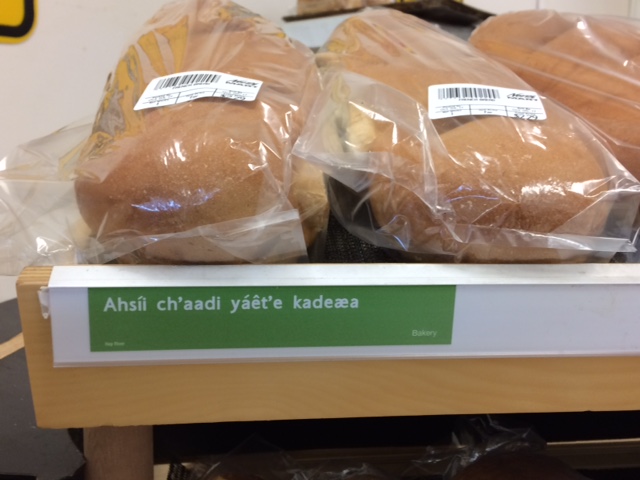Shoppers across the Alaska and Canadian Arctic can now find some items in local indigenous languages
Grocery shoppers in Arctic Alaska and in communities across northern and Arctic Canada can now select items labeled in their regions’ indigenous languages, a leading rural retail company announced.
The North West Company has placed indigenous-language signs identifying 80 products in most of its Alaska Commercial Company stores in rural Alaska and in its Northern and NorthMart stores across Canada. There are also bigger signs that say “welcome” and “thank you” in the local indigenous languages.

Stores in the program stretch from locations on the Bering and Chukchi seas in the west to Canada’s Baffin Island in the east.
The Winnipeg-based company has worked with interpreters to identify 80 products by their Native-language names – three different languages in Alaska and 12 Canada, with the Canadian languages broken down into 30 different regional dialects. In all, 19 Alaska stores and about 120 Canadian stores are participating in the program, said Derek Reimer, North West’s director of business development Director.
The idea grew out of a 2012 visit by the company’s chief executive to the Alaska Commercial store in the town then known as Barrow, and now formally named Utqiagvik.
In that community and in others where the North West Company does business, Reimer said, there are elders who are more comfortable speaking their indigenous languages than English. The language-labeling project is a way to connect with elders and other customers, he said.
“This was a way, out of respect for those community members, that we could reflect that in our stores,” Reimer said.
The labeling project goes beyond simple displays. Through an interactive feature, it provides instruction on how to pronounce the indigenous words. Recordings are accessed through mobile tagging, in which a smartphone app reads QR codes posted by the selected store products. The QR code postings are not available yet in all stores with indigenous languages, however.

The indigenous-language signs went up at the start of October, Reimer said.
For some food names, translations between indigenous languages and English are straightforward. Salmon, for example, is called ikalugruak in the Inupiaq dialect spoken on the North Slope, according to a dictionary published by the University of Alaska. But the North West Company’s project had to tackle some more difficult translations. One example was the Inupiaq phrase for bananas: Monkich niqinich, meaning “monkey food.”
The North West Company’s cultural heritage is getting attention in other ways. Its precursor, the Alaska Commercial Company, is scheduled to be honored on Nov. 11 at the Jewish Cultural Gala in Anchorage. The Alaska Commercial Company was formed 150 years ago when Russia transferred Alaska to the United States and a pair of Jewish merchants in San Francisco bought the assets of the Russian-American Company.
The Alaska Commercial Company has significance in Alaska history that goes beyond business and commerce. Stores were used as community centers and locations for delivery of government services. The company should be celebrated for “promoting and modeling diversity and tolerance” and for an “historic contribution to the purchase of Alaska,” the Jewish Cultural Gala’s website says.
Reimer said company officials plan to be at the gala.
“It’s quite an honor for us to be recognized and I think it speaks to the long history of the company going back 150 years,” he said. “We try to reflect many of the important values that these founders followed in terms of their business ethics, charity and community building.”